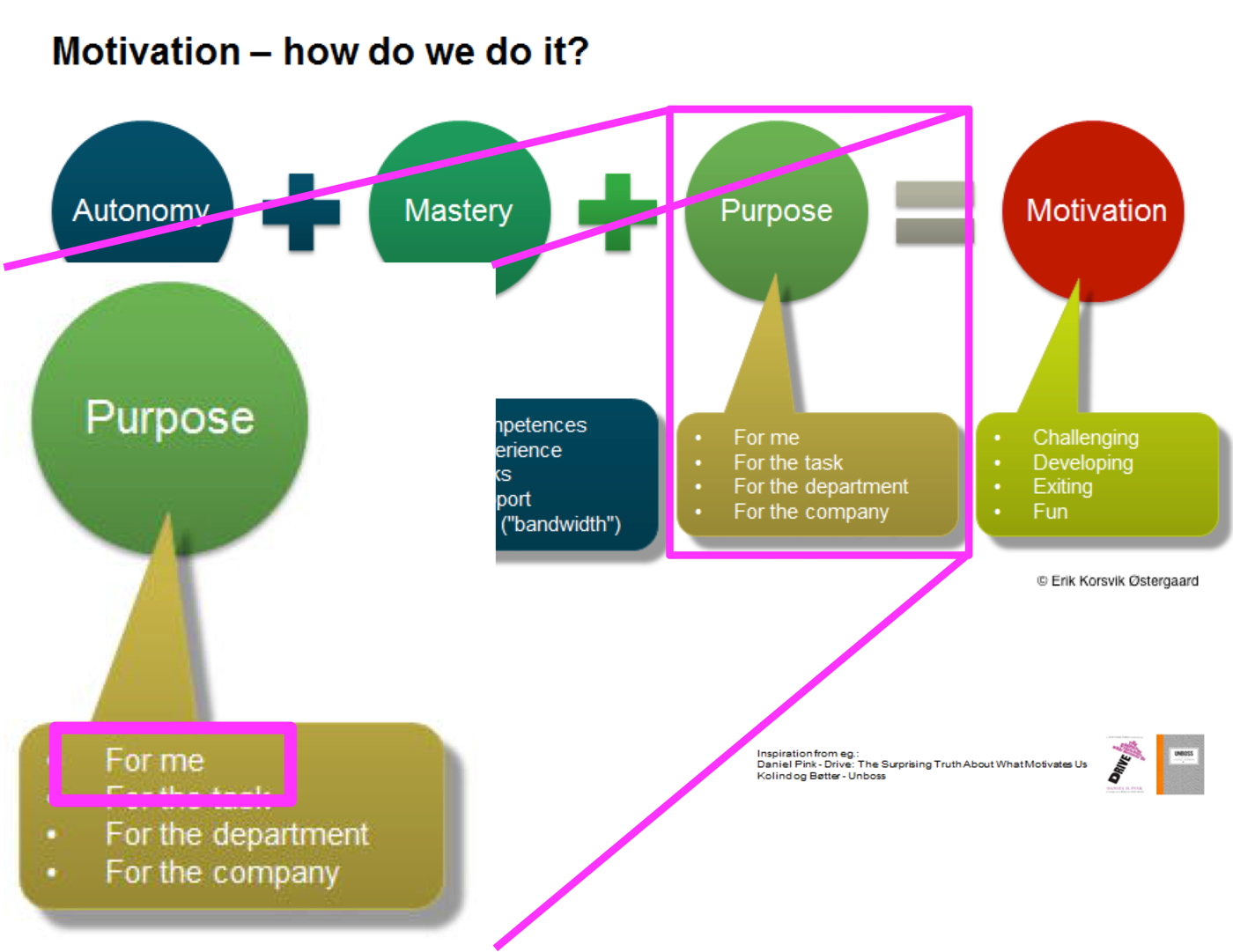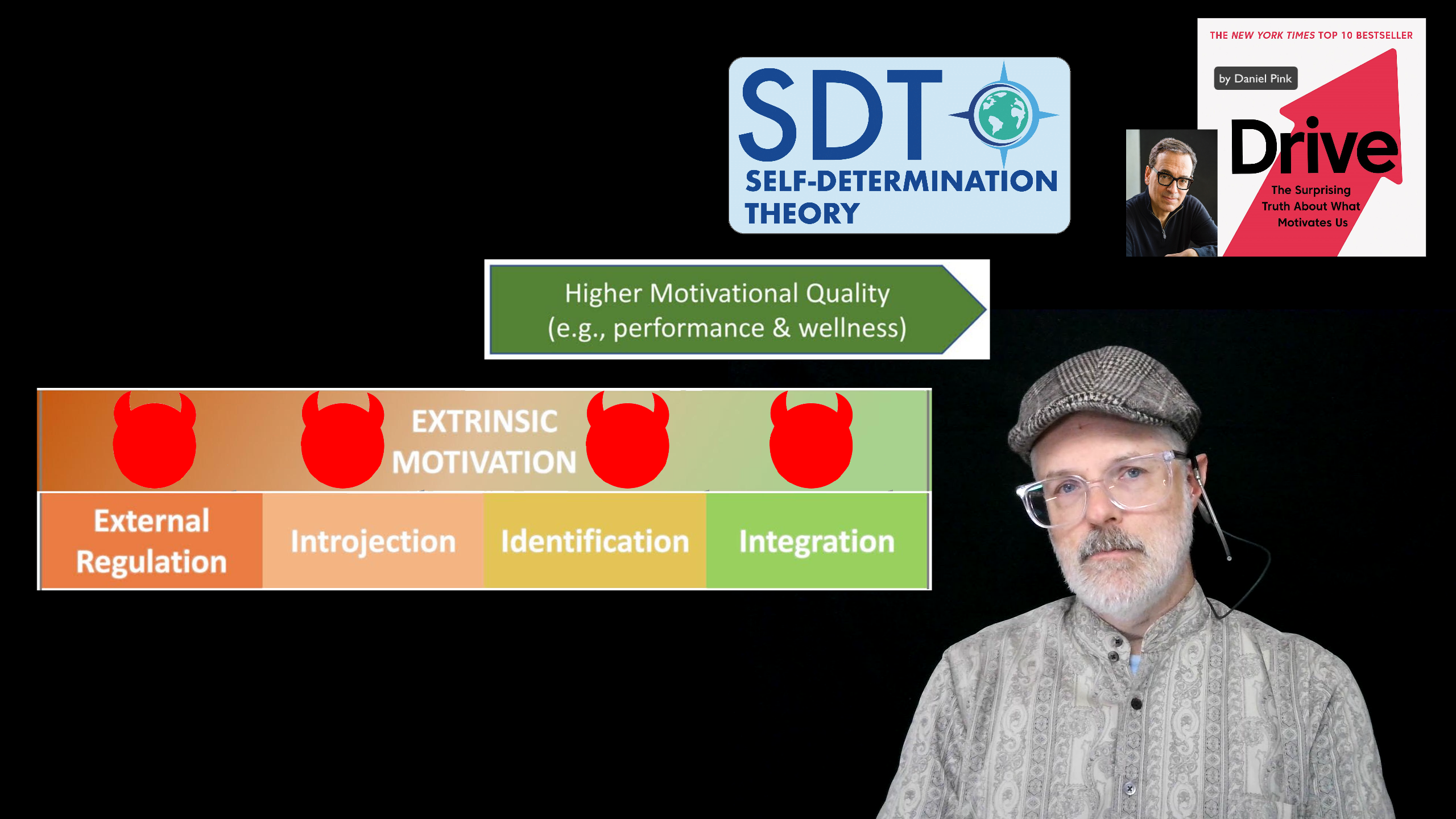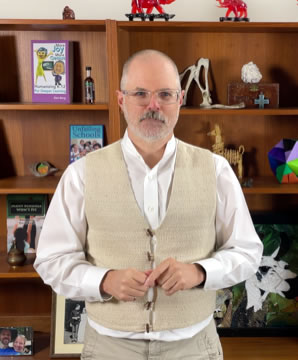Correcting Drive by Daniel Pink
In the book Drive by Daniel Pink he made a substitution which is either prescient or problematic, perhaps both.
The book came out in 2011 and Self-Determination Theory (SDT) is the main inspiration for his model, though he clearly deviated from the science.
The substitution he made was to include purpose but exclude relatedness.
The book claims that autonomy, mastery (known as competence in the scientific literature), and purpose are the crucial ingredients of intrinsic motivation.
Pink would do us all a service if he would update his book to more accurately reflect the current state of the science.
Assuming the Best of Drive by Daniel Pink
To be generous I am going start off by interpreting his word choice as a prescient anticipation of more recent research into whether or not the the list of primary human needs should include beneficence and/or meaningfulness (which are words that can be used as a synonyms for purpose).
When meaningfulness was studied, naturally it had a wonderful positive effects on well-being.
However, the crucial question is what the relationship is between the effects of meaningfulness and the other needs that had already been established.
Specifically, there have been decades of research proving that relatedness, autonomy, and competence are primary human psychological needs.
The crucial criteria for our purpose now is that all three were found to have had non-neutral effects on well-being and that those effects, both positive and negative, were not derived from any other needs.
Before I mention the results of that research into meaningfulness you have to know that in addition to the three primary needs the need for beneficence had already been established as a secondary need.
Beneficence is secondary because it causes positive effects on well-being when it is satisfied but does not cause any negative effects when it is thwarted, thus failing to meet the criteria for non-neutral effects on well-being.
In summary, beneficence is nice to have, but not missed when it is gone, whereas all three of the primary needs are missed when they are gone, in the form of diminished well-being.
When researchers finally got around to researching the relationship between meaningfulness and the other four needs they found that controlling for the variances in well-being caused by those other needs left nothing for meaningfulness to explain.
Thus, meaningfulness is entirely derived from the needs for relatedness, autonomy, competence, and beneficence, thus it fails to meet the criteria that it not be derived from other needs.
When working on universal needs that affect all humans, it is important to distinguish among primary, secondary, and derivative needs.

Purpose as Beneficence in Drive by Daniel Pink
Giving Daniel Pink the benefit of the doubt we can say that he was sort of right if we interpret his use of “purpose” as meaning beneficence.
But, he was wrong to leave out relatedness because it is a crucial component of what scientists have actually found contributes to well-being, independent of the effects of beneficence.
This is a problem when his use of the term “purpose” misleads people.
Take the example shown below that I found in an image search on the internet.
The crucial detail to notice is the first descriptor under purpose.
The creator clearly states that serving yourself constitutes an aspect of purpose.
However, that is exactly contradictory to what beneficence means.
Beneficence is specifically defined as being about something other than yourself.
So, while I want to give Pink the benefit of the doubt, his use of terminology might be causing problems for those relying on his popular but misleading account of the science.

Intrinsic/Extrinsic Motivation Dichotomy in Drive by Daniel Pink
Another problem with the book Drive, and some of the talks that Pink has given based on it, is the emphasis on the dichotomy of intrinsic versus extrinsic motivation.
The problem arises when intrinsic motivation is valorized as if it is the only worthwhile type of motivation and extrinsic motivation is demonized as if it is always harmful.
The current state of the science is that extrinsic motivation occurs on a spectrum with four distinct types.
Two of those types have positive effects on well-being, thus demonizing all extrinsic motivation is a bad idea.
When simplifying the science down to a dichotomy is necessary, the currently favored strategy in SDT is to refer to “autonomous motivations” that have positive effects on well-being (including those two forms of extrinsic motivation).
Whereas, “controlled motivations” are those that have negative effects on well-being (which includes both of the other two forms of extrinsic motivation and amotivation which is when motivation is lacking entirely).
Given that Drive was a best-seller and that it is misleading some people let me address Daniel Pink directly.
Mr. Pink, would you be kind enough to write an update of your book Drive to clarify the current state of motivation science.
Go ahead and claim that you had beneficence in mind when you threw in “purpose” but please clarify that relatedness is also a crucial causal factor.
Finally, I encourage you to disavow the misleading demonization of extrinsic motivation by abandoning the outdated intrinsic/extrinsic dichotomy.
Please refer to autonomous and controlled motivations, instead.
If you absolutely insist on generating your own unique terms that are unrelated to the science, please explain in the footnotes how and why you are making those substitutions.
Thank you all for watching.

Links and resources:
Center for Self-Determination Theory
Meaningfulness research: Martela & Riekki (2018) & Martela, Ryan, & Steger (2018)
Beneficence research: Martela & Ryan (2015), Martela & Ryan (2019) & Davis (2022)
Drive Graphic from a reader who may have been slightly misled.
This article was printed from HolisticEquity.com




